Dubai is a prime location for businesses looking to expand their operations to the Middle East and North Africa (MENA) region. The city’s position as a trading hub and its numerous benefits for businesses make it an attractive destination for entrepreneurs. Despite the global pandemic and economic downturn, the UAE’s economy is set to grow faster than it has in over a decade. The economy is projected to grow by 5.4% and 4.2% in 2022 and 2023, respectively, which has encouraged entrepreneurs to explore the city’s many opportunities.
Before starting a business in Dubai, entrepreneurs must consider several key factors. One of the most significant decisions is whether to establish the company in a Free Zone or Offshore. Both have their own set of benefits and requirements. In a free zone, entrepreneurs can have 100% ownership of their company, and the corporation tax rate is 9% for UAE businesses that earn profits above AED 375,000. Personal income tax is 0%. However, companies cannot trade directly with the local UAE market, and there are over 30 different free zones, each designed for specific industries, such as Dubai Multi Commodities Centre (DMCC), Dubai International Financial Centre (DIFC), and Dubai Internet City (DIC).
Alternatively, companies can register as offshore businesses in a free zone, with similar advantages but certain limitations. An offshore company can have business activities outside the UAE, but not inside it, and there is no minimum capital deposit required before incorporation. However, a sponsor is required, which restricts foreign ownership to only 49%.
Entrepreneurs must also decide on the type of license they require. The Department of Economic Development (DED) is responsible for issuing licenses, and there are three main types to consider. A commercial license is needed for trading activities, import and export, sales, logistics, travel and tourism, general stores, and real estate. An industrial license is issued to companies involved in manufacturing activities that convert natural materials and resources into final products, such as textiles, metal, and paper manufacturing. A professional license is for businesses that provide services, artisans, and craftsmen, such as medical services, beauty salons, and repair services.
Another key consideration is sponsorship. No local sponsor is necessary for a free zone company setup, which allows entrepreneurs to establish an entity with 100% foreign ownership without the need for a UAE national as a partner or sponsor.
To set up a business in Dubai’s free zone, here are the seven steps to take:
- Find your business activity: Determine the nature of your venture and select from over 2,100 business activities available in the industrial, commercial, professional, and tourism space.
- Decide on a free zone: Choose a free zone that aligns with your business needs and sector.
- Choose a company name: The UAE has strict naming conventions, so ensure the name does not include offensive language or references to political groups or the mafia.
- Apply for initial approval: Submit the application for initial approval from the free zone authority.
- Choose a facility and sign the lease agreement: Decide on the appropriate space for your business and sign the lease agreement.
- Apply for a business license: Apply for a business license from the relevant authority, such as DED.
- Register your company: Complete the registration process and obtain the necessary documents to start operating your business.
Dubai’s free zones offer several benefits for entrepreneurs, such as zero personal income tax, low corporate tax rates, and 100% company ownership, among others. The process of setting up a business in Dubai’s free zone is relatively easy and straightforward. If you are considering starting a business abroad, Dubai’s free zone is a great option, given the region’s economic growth prospects and the numerous benefits the city offers.



